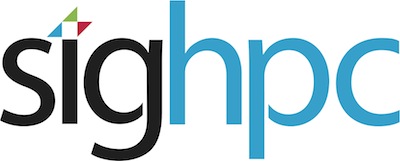In Cooperation: 
2017 International Workshop on Software Engineering for High Performance Computing in Computational and Data-Enabled Science and Engineering
November 12, 2017
Held in Conjunction with
SC17
Part of the Software Engineering for Science Workshop Series
Home
Call for Papers
Committee
Schedule
Call for Papers
Challenges in both computational and data-enabled science & engineering (CoDeSE) continue to push the boundaries of available computing resources. There is a demand to utilize high performance computing (HPC), including GPGPUs and computing clusters, for CoDeSE applications.
However developing the software that can address these challenges is not an easy task, particularly for large-scale platforms. Developers must solve reliability, availability, and maintainability problems in extreme scales, understand domain specific constraints, deal with uncertainties inherent in scientific exploration, access and analyze very large data sets, and develop algorithms that use computing resources efficiently.
Software engineering (SE) researchers have developed tools and practices to support various development tasks, including: requirements management, design, validation + verification, deployment, and maintenance. However software development for HPC has historically attracted little attention from the SE community. Paradoxically, the HPC CoDeSE community has increasingly been adopting SE techniques and tools. Indeed, the development of CoDeSE software for HPC differs significantly from the development of more traditional business information systems, from which many SE best practices and tools have been drawn. Development of HPC CoDeSE software requires tailoring of SE tools/methods developed for more traditional software applications to fit the requirements of HPC applications.
The SE-CoDeSE workshop addresses this need by bringing together members of the SE and HPC CoDeSE communities to share perspectives, present findings from research and practice, and generate an agenda to improve tools and practices for developing HPC CoDeSE software.
Scope and Aims
We encourage submission of papers from members of the SE, HPC, and CoDeSE communities. Papers of at most 8 pages (ACM Format) are solicited to address issues including but not limited to:- Case studies of both successes and/or failures in applying SE tools and practices to the development and/or maintenance of HPC CoDeSE software, with sufficient analysis that leads workshop attendees to learn something more general than just the specific case study;
- Measures of software development productivity appropriate to HPC CoDeSE applications;
- Lessons learned from HPC CoDeSE applications throughout the product life cycle, from research and development to design, analysis, construction, testing, deployment, continuous integration, and maintenance of software;
- SE metrics and tool support for HPC CoDeSE applications;
- Empirical studies that help researchers better understand the environment, tools, languages, and processes used in HPC CoDeSE software development and how they might be improved; and
- V&V techniques target specifically for the HPC CoDeSE domain;
The organizing committee hopes for participation from a broad range of stakeholders from across the SE, CoDeSE, and HPC communities. We especially encourage members of the HPC and CoDeSE communities to submit practical experience papers. Papers on other related topics are also welcome. Please contact the organizers with any questions about the relevance of particular topics.
Accepted papers will be published in a Workshop Proceedings. At least one author of each accepted paper must register as a full participant in the workshop to have the paper appear in the proceedings. We plan to produce a workshop report which summarizes the workshops findings. Some paper authors will be invited to revise their papers for submission to Computing in Science & Engineering following the workshop.
Important Dates
Submission Deadline: August 20, 2017Author Notification: September 15, 2017
Camera Ready: TBD
Workshop Date: November 12, 2017
Submission Instructions
Please observe the following:- Papers should be at 8 pages (full papers) or 4 pages (postition papers), plus up to 1 additional page for references.
- Format your paper according to the ACM Guidelines
- Submit your full papers via EasyChair
Last Updated on August 3, 2017 by Jeffrey Carver